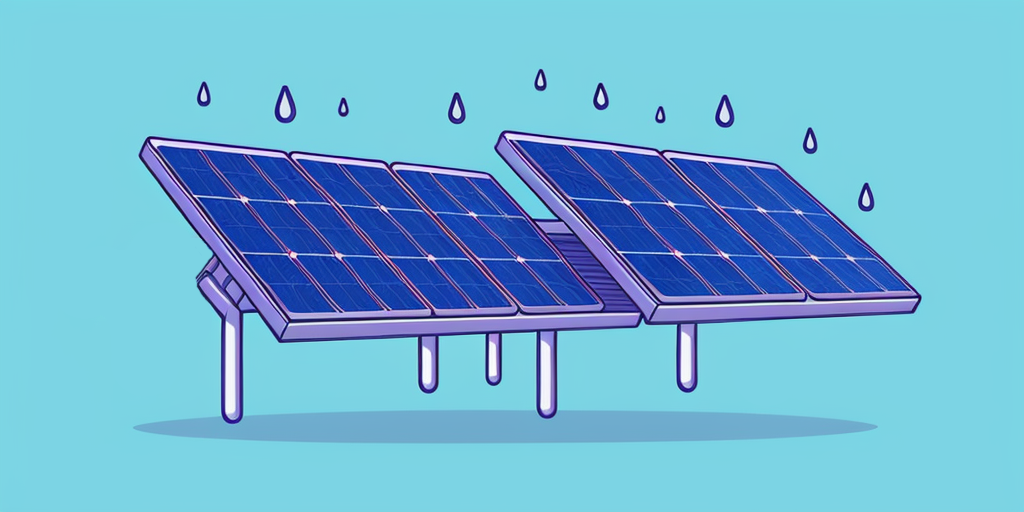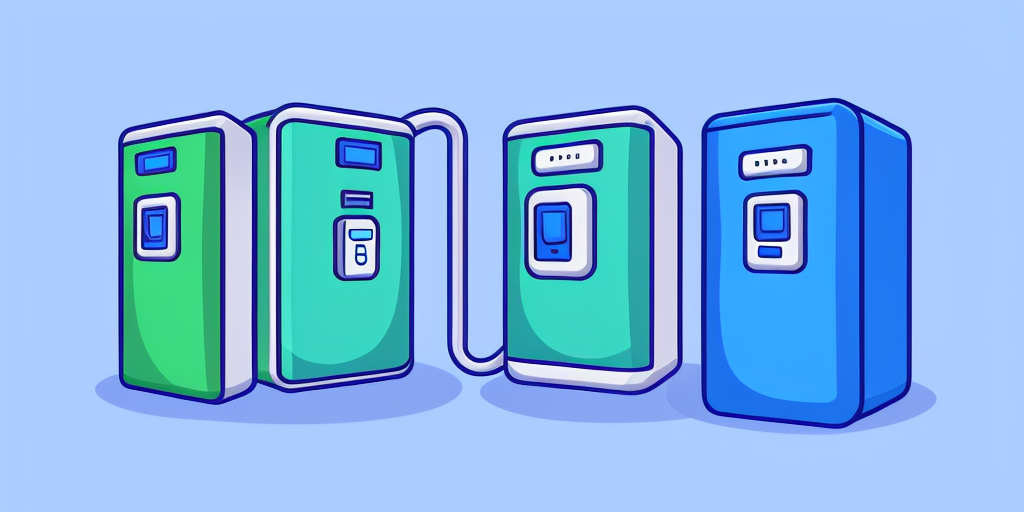Yes, solar energy is really popular these days. Everyone seems to be installing solar panels on their roofs and reaping the benefits of clean, renewable electricity. But, before you jump on the solar bandwagon, hear me out. We’ll go over 9 reasons not to buy solar panels because the truth is, they may not be the ideal choice for every household. Yes, you read it correctly: we’ll play devil’s advocate and investigate the potential limitations of adopting solar energy. We’re not trying to spoil your enthusiasm for solar energy, we want you to make sure you have all of the facts you need to make an informed decision.
Solar panels, while a terrific way to harness the power of the sun, can take up a lot of room. If you live in a small apartment or a cozy condo, you may not have enough space for solar panels. Not to mention the challenges of putting ground-mounted solar panels in a small yard.
The condition and age of your roof is also a critical factor. Solar installations are versatile and compatible with most roof types, but there’s a catch: the roof needs to be robust enough to sustain the stress of the panels during installation and withstand the weight afterwards. If your roof is already in a frail condition or showing signs of damage, adding solar panels might exacerbate the issue. Plus, if you’re contemplating getting a new roof in the near future, it might be worth it to hold off on installing solar panels until that work is complete. Installing solar panels only to remove them for a roof replacement can lead to redundant costs and additional installation procedures.
Space, of course, also plays a crucial role. The average home would require around 17-21 solar panels, which occupy approximately 300–370 square feet of space. A smaller roof may not be able to accommodate the number of panels required to make a significant impact on your utility bills. In sum, while solar panels can offer a sustainable way to harness energy, the reality is that their effectiveness is largely dictated by the suitability of your roof and space. If you don’t have room to create enough energy to power your home or company, you might have to look at other solar options for homes with limited space, including the possibility of joining a community solar project.
Property rights are a major factor in whether or not a home can install solar panels. If you don’t own the land, putting up solar panels is an intricate procedure that provides getting permits and negotiations. Let’s first take a look at the situation for renters. Solar panel installation is at the discretion of the building owner or landlord, not the tenant. You can try to persuade or interest your landlord by explaining the benefits and potential savings, but they may not be persuaded or intrigued. Even if they do agree, there may be a lot of back-and-forth about details and legalities.
The scenario can get considerably more intricate for condo or multi-unit apartment owners. Even if you own your apartment, the roof is probably HOA property (Homeowner’s Association). An HOA’s blessing would be needed to install solar panels in such a setting. This can take some time, and it’s not always easy to persuade locals of the merits of solar power. In both scenarios, the common theme is a lack of direct control over the property where the panels are to be installed. This can lead to hurdles in the adoption of solar energy and is a significant reason why some people might choose to forego solar panels. But don’t worry, there are other solar energy options for apartment owners and renters.
When it comes to solar energy, the weather can have a significant impact on the performance of your solar panels. Since solar panels produce electricity from sunshine, they will not be as effective on cloudy days. Nor will they produce energy on those lengthy winter nights when the sun sets early and rises late.

But don’t give up just yet. Solar panels can still create energy on overcast days, but not as much as on sunny days. You can expect solar panels to produce between 10-25% of their normal power out on overcast days. If you reside in a region with plenty of sunny days, like California, solar energy could be a terrific alternative for you. However, in areas with unpredictable weather patterns, it is critical to consider the potential drawbacks of relying on solar energy. Extreme weather conditions, such as hail or strong winds, can damage and impair the operation of solar panels.
Shade is another factor that can significantly affect solar panel efficiency. Solar panels thrive on direct sunlight, and constant shade on your roof—whether from tall trees or neighboring buildings—can greatly reduce their performance. Lastly, the orientation and layout of your roof can play a pivotal role in the effectiveness of a solar installation. Roofs that predominantly face away from the sun or have a slope that doesn’t catch the sun effectively can generate significantly less solar power. So, before investing in solar energy, you should investigate the weather patterns in your area to see if solar energy is a viable option for you.
We all know that solar panels are costly, but how much are we talking about? According to Energy Sage’s marketplace, the price range for installing solar panels, factoring in the federal solar tax credit, falls approximately between $17,430 and $23,870. These figures can give us an idea of the financial investment involved. To put it into perspective, the average cost per watt for solar panels in 2023 is around $2.95, and that’s before considering any incentives. That’s a lot of money.
Currently, the solar tax credit is 30%, so you may deduct roughly 1/3 of the cost of a solar energy system from your taxable income. Still, there are other costs to consider like maintenance. Solar panels must be serviced on a regular basis to guarantee they perform properly. This includes cleaning the panels, inspecting them for deterioration, and keeping track of their performance. Many underestimate the amount of upkeep required for solar panels and neglecting maintenance might result in lower performance and perhaps costly repairs in the future.
Solar panel maintenance costs range from $140 to $180, or $280 to $720 each year. Depending on the manufacturer and the instructions that came with your solar panels, you should perform routine maintenance at least twice a year. In order to prevent major issues, some property owners choose to have routine maintenance performed four times a year.
Energy storage plays a crucial role in the overall effectiveness of solar energy systems. While solar panels are a sustainable and environmentally friendly source of electricity, they have limitations when it comes to supplying power during certain conditions, such as power outages or periods of low sunlight. One common misconception about solar energy is that it can provide electricity even during a power outage. However, this is not the case if your solar panels are not equipped with an energy storage solution. Without a battery backup system, any surplus energy generated by your solar panels is automatically sent back to the grid. Consequently, when there is a power outage at night or on a cloudy day, your solar panels alone will be unable to supply energy to your home or business.

These systems allow you to store the excess energy produced by your solar panels for later use, particularly during power outages or when your energy consumption exceeds the solar panel production. However, it is important to note that energy storage systems can be costly, requiring an additional investment on top of the solar panel installation. A single lead-acid battery, for example, can cost between $200 and $800, whereas a household lithium-ion solar system can cost between $7,000 and $14,000. Additionally, they require regular maintenance to ensure optimal performance and longevity. These factors should be taken into account when considering the overall cost and benefits of incorporating energy storage into your solar energy system.
Net metering regulations are an important aspect to consider when contemplating solar panel installation. Net metering is a billing mechanism that allows households and businesses to sell excess solar energy back to the utility grid, essentially giving and taking energy with the power company. Nonetheless, it is essential to recognize that net metering policies vary from state to state and can change over time. As of now, 38 states plus D.C. offer net metering regulations.
In some states, there may be limitations on the net metering programs, which means you might not be able to sell all the excess energy you generate. In many states that lack a formal mandate, voluntary net metering programs are often established by utility providers or local authorities. A notable example can be seen in Texas, where net metering services are provided in San Antonio and Austin. If you live in an area where net metering is available, the credits for your excess energy production may be provided in one of two ways:
It’s advisable to consider factors such as the availability of net metering programs, any associated fees, and the overall financial impact on your energy bill before investing in solar panels.
In 2022, Congress extended the Investment Tax Credit (ITC) and raised it to 30% for installations between 2022 and 2032. But while there is a federal residential solar energy credit that allows taxpayers to claim a percentage of the cost of a solar PV system on their federal income taxes, it’s important to note that not all states offer tax incentives for solar installations. State-level incentives can vary greatly, with some states providing generous tax credits or refunds, while others have limited or no incentives in place. Additionally, these incentives can be subject to eligibility criteria and specific installation requirements. Therefore, it is crucial to research and understand the availability of incentives in your state to determine the potential benefits and limitations when considering solar panels.

Considering both state and federal incentives can help you make an informed decision about going solar. By understanding the potential benefits and limitations of available incentives, you can evaluate the financial feasibility and overall appeal of solar energy for your specific circumstances.
Solar panels rely on sunshine to create energy, so the amount of sunlight received by your property can affect the performance of your solar panels. When deciding whether solar energy is a viable option for you, you should consider your energy needs. Solar panels create electricity during the day, which may not correspond to your energy use habits. Solar may not be the most efficient energy source for you if you use more electricity at night.
But don’t worry, there are solutions to these potential problems. A specialist can evaluate your solar potential and advise you on the optimal position for solar panels. If your energy consumption patterns do not line with solar energy, energy storage solutions are available to ensure you have access to clean, renewable energy when you need it. So, if you’re thinking about going solar, you should consider your solar potential as well as your energy needs before making a decision. Solar energy can be a terrific alternative for many homeowners and businesses with the correct solutions in place.
If you are currently renting a home or plan to move soon, you should carefully assess if investing in solar panels is the best option for you. As previously stated, solar panels can be fairly costly, requiring a considerable initial investment. Typically, it requires an average of 8.7 years to recoup the upfront investment made in installing solar panels. So unless you’re planning to stay in your existing house for at least 10 years, it may not be worth the cost.
But there are other ways to cut your energy consumption and lower your energy bills. You can, for example, use portable solar panels, this way when you move, you can take them with you. Alternatively, you can subscribe to a solar community farm. Although not as effective as solar panels, these measures can still make a significant difference in your energy consumption and costs.
Solar energy offers numerous benefits but also comes with its considerations. Before investing in solar panels, it’s important to weigh potential drawbacks and limitations. However, don’t let these challenges deter you. Solar panels can reduce your carbon footprint, enhance energy independence, and save on costs.
Research, assess your solar potential and energy needs, and explore incentives and financing options. Embrace the fun and satisfaction of generating your own clean energy. This article aims to inform your decision-making process. Whether you choose solar panels or or other clean energy alternatives, your efforts to make a positive impact on our planet are commendable.
Although costs have decreased in recent years, the initial cost of installing solar panels can be high, with an average of of $20,650 in the US. It will then take an average of 8.7 years to recoup the investment.
Solar panels function in all weather situations, however their efficiency is lowered in overcast or wet conditions. This can be mitigated by adding larger solar panel systems or utilizing energy storage solutions such as batteries.
While solar panels can significantly reduce your electricity bill, you may still be required to pay for some grid electricity. This is determined by factors such as the size of your solar panel system, your energy consumption, and your location.
Solar panels help to reduce your monthly electricity bills and may raise the value of your property more than comparable properties without solar panels. According to Zillow, properties with solar energy systems have a 4.1% higher selling point than those without solar energy.
Stay a while and read more posts like this
In recent years, Europe has witnessed a remarkable surge in the adoption of solar panels, marking a pivotal shift towards renewable energy. Data from the...
Renewable Energy, Solar Energy, Solar Energy Basics, Solar Technology
“Unlock the Truth: Get the Facts on Solar Energy!” Introduction Solar energy is becoming increasingly popular as a renewable energy source, but there are...
Imagine a world where you’re able to cut your monthly energy expenditure substantially. A reality where your home isn’t reliant on finite,...